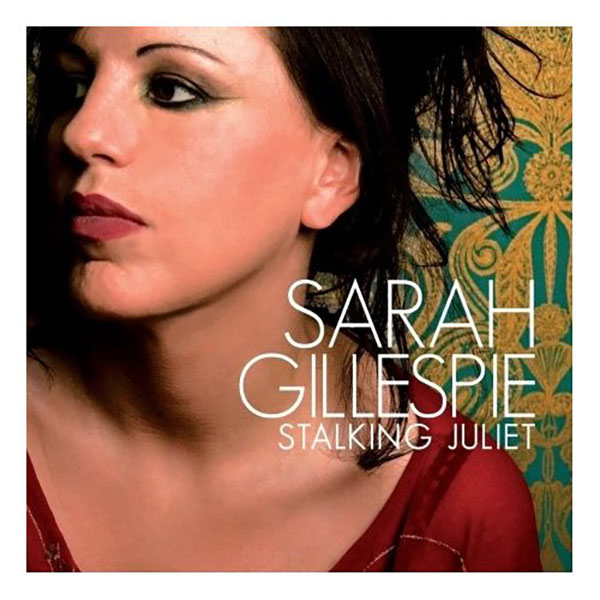
by Ian Mann
June 20, 2009
/ ALBUM
An astonishingly mature and accomplished début. Intelligent, poetic songs and wonderfully colourful arrangements
This remarkable album by Greenwich born singer/songwriter Sarah Gillespie is an astonishingly mature and accomplished début. Gillespie seems to have arrived more or less fully formed as a songwriter and lyricist and “Stalking Juliet” combines these talents with the playing, arranging and production skills of the extraordinary Gilad Atzmon to deliver something very special.
Gillespie’s songs are impressive enough in themselves with their sensual,earthy, poetic lyrics but Atzmon’s colourful, imaginative arrangements move the songs to a whole other level. The ex-expatriate Israeli saxophonist also adds clarinet, accordion and harmonica to his instrumental arsenal in a hugely impressive display. Regular Atzmon colleague Asaf Sirkis provides typically incisive and intelligent drums and percussion and is an also a vital component in the album’s success. Other important contributions come from bassist Ben Bastin, guitarist Billy Adamson, pianist John Turville and Sameer Makhoul on violin and oud. Gillespie herself also features as a guitarist.
“Stalking Juliet” has acquired a good deal of attention from the mainstream music press (four stars in Mojo magazine , for example) and with songs of this quality it’s easy to see why. Although Gillespie sometimes sings in an exaggerated Cockney accent full of glottal stops a la Lily Allen her lyric writing is inspired by figures from the other side of the pond-Tom Waits, Bob Dylan, Leonard Cohen, Joni Mitchell. The Mitchell comparison is particularly apt as these songs are written from a uniquely female perspective. They are sensual, provocative, unsettling and full of arresting, dramatic, poetic imagery. Sometimes Gillespie sings in character (“Malicious Simone”) and with Atzmon around it’s not surprising that she occasionally flirts with politics (“Ahmed & Dangerous”) but mostly these songs depict twisted affairs of the heart, doomed relationships, star crossed lovers.
With lyrics that scan as poetry in themselves this is remarkable enough but the talents of Atzmon and his colleagues add such vivid musical colour that one can’t help being beguiled by this extraordinary record.
The title track comes roaring out of the blocks with Atzmon’s double tracked horns, Sirkis’ driving drums and a big chorus that instantly grabs the attention.
“Big Mistake” adds world music elements through Sirkis’ urdu, Makhoul’s violin and Atzmon’s clarinet. With a memorable melody and a lascivious lyric this is another song that really hits the spot.
“Close Range” is a haunting, twisted ballad with the potential to become an enormous left field hit.Tory Amos is another possible reference point here with John Turville’s piano prominent in the arrangement.
There is then a complete change of pace with the catchy, accordion driven “How The Mighty Fall” which pairs tongue twisting verses with a rousing chorus.
“Malicious Simone” is a delicious slow blues paced by acoustic guitar, piano, smoky saxophone and Emma Stockton’s gospel inspired backing vocals. Fronted by Gillespie’s aching voice it’s stark, dramatic and very impressive.
Accordion forms the basis of the lilting, yearning “Millions Of Moons” with Adamson’s soaring guitar providing a sting in the tail.
“Ahmed & Dangerous”, co-written with Atzmon is an intriguingly skewed look at Middle Eastern politics and not without it’s humour. Atzmon also shares the credit on the vaudevillian “Houdini Of The Heart”, Tom Waits a definite influence here. Waits is also one of the influences on “Don’t Be Sorry” a New York tale that incorporates Dylanesque harmonica and another scorching solo from Adamson.
Atzmon’s “Call Me Stupid, Ungrateful, Vicious and Insatiable” originally appeared in instrumental form on his recent “In Loving Memory Of America” album (reviewed elsewhere on this site). Gillespie’s lyrics and vocals turn the piece into a dark unsettling song paced by Turville’s piano and featuring the rich, woody sound of Atzmon’s clarinet.
The closing “Sleep Talking” is starkly beautiful with Sirkis on urdu and Makhoul’s violin adding colour to the arrangement.
There isn’t a weak song amongst these eleven tracks. “Stalking Juliet” isn’t in any sense a jazz album and has no aspirations to be so. It isn’t just a left field “singer songwriter” album either. The combined forces of Gillespie and Atzmon have created something unique blending London, North American and Middle Eastern influences into a colourful single entity. This is music that should appeal to discerning listeners of all musical persuasions. It’s intelligent and thought provoking but without being in any way difficult and there are some truly memorable choruses to latch on to.
“Stalking Juliet” is an album that deserves to be nominated for the next Mercury Music Prize. Unlike the annual “token jazz entry” this beguiling album is accessible enough to have a genuine chance of winning. It’s bright and melodic but without in any way compromising it’s intelligence.
This is an album that deserves to be widely heard. On the evidence of “Stalking Juliet” Sarah Gillespie has genuine star potential. The thinking man’s Amy Winehouse perhaps ( but without the baggage hopefully).
That said it should be stated that this album is Atzmon’s almost as much as Gillespie’s-his presence is everywhere and his contribution enormous. Given his busy schedule with his own projects it is possible that “Stalking Juliet” is a one off project as far as Atzmon is concerned. Unless the album really takes off-as it undoubtedly deserves to-Atzmon may not be around for the follow up. It will be interesting to see how Gillespie copes without him when push comes to shove.
In the meantime though we can all enjoy this excellent album. Highly recommended.
blog comments powered by Disqus